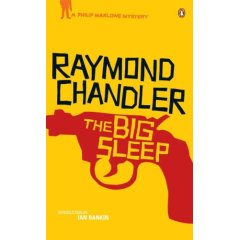 Occasionally I get the urge to go back and read some of the classics within genres--the ones that most libraries have on the shelves not because of the overwhelming demand for them but because they have attained a sort of sacred status that exonerates them from any to-be-weeded list. I probably shouldn't be so harsh with Raymond Chandler's 1939 classic The Big Sleep. The first of Chandler's novels, it introduces Philip Marlowe, the Los Angeles-based private eye perfectly embodied in the equally classic 1946 film by Humphrey Bogart.
Occasionally I get the urge to go back and read some of the classics within genres--the ones that most libraries have on the shelves not because of the overwhelming demand for them but because they have attained a sort of sacred status that exonerates them from any to-be-weeded list. I probably shouldn't be so harsh with Raymond Chandler's 1939 classic The Big Sleep. The first of Chandler's novels, it introduces Philip Marlowe, the Los Angeles-based private eye perfectly embodied in the equally classic 1946 film by Humphrey Bogart.As one of the first (and best) of the hard-boiled, haunted PIs of crime lit, Marlowe's character can sometimes be pretty cliched to modern readers, but Chandler's ability to portray the desperate seediness of Depression-era LA still puts to shame many modern writers. If you can't feel the dank rot underlying Marlowe's LA, you're not paying very close attention to Chandler's prose. And in The Big Sleep, everyone has a bit of rot in them. The plot is famously knotted (Chandler himself claimed not to know the motives behind one of the deaths), but what begins as a case of blackmail swiftly turns into murder--and then the serious crimes start to happen. Chandler keeps the twists and turns coming, with characters so shady it's a wonder they don't immediately shrivel up in the sunlight.
In spite of all the deaths, there isn't a whole lot of graphic violence, and the language is relatively cuss-free. For those reasons, The Big Sleep may appeal to older readers turned off by gratuitous violence or foul language, but who still want a compelling mystery. For any reader who likes a complicated private eye on a twisted case, Chandler's work still sets a benchmark in crime fiction.
.jpg)
No comments:
Post a Comment